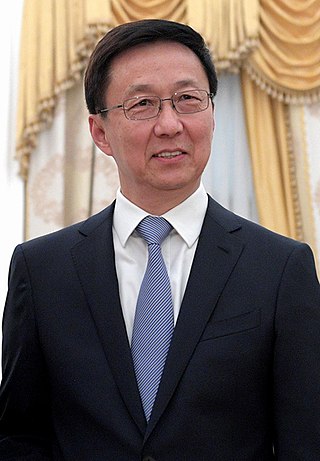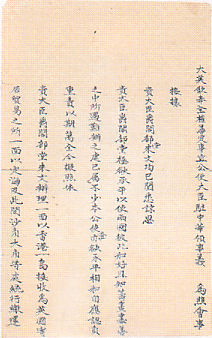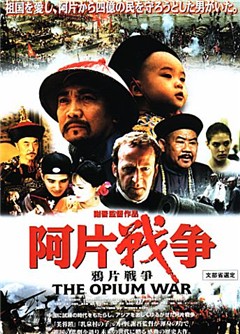This article needs additional citations for verification .(August 2018) |
| |||||
| Decades: | |||||
|---|---|---|---|---|---|
| See also: | Other events of 1849 History of China • Timeline • Years | ||||
Events from the year 1849 in China .
This article needs additional citations for verification .(August 2018) |
| |||||
| Decades: | |||||
|---|---|---|---|---|---|
| See also: | Other events of 1849 History of China • Timeline • Years | ||||
Events from the year 1849 in China .

Han Zheng is a Chinese politician serving as the current vice president of the People's Republic of China since 2023. He previously served as the first vice premier of the People's Republic of China between 2018 and 2023, and as a member of the Politburo Standing Committee of the Chinese Communist Party (CCP) between 2017 and 2022.

The Convention of Chuenpi was a tentative agreement between British Plenipotentiary Charles Elliot and Chinese Imperial Commissioner Qishan during the First Opium War between the United Kingdom and the Qing dynasty of China. The terms were published on 20 January 1841, but both governments rejected them and dismissed Elliot and Qishan, respectively, from their positions. Foreign Secretary Lord Palmerston stated that Elliot acquired too little while the Daoguang Emperor believed Qishan conceded too much. Palmerston appointed Major-General Henry Pottinger to replace Elliot, while the emperor appointed Yang Fang to replace Qishan, along with Yishan as General-in-Chief of Repressing Rebellion and Longwen as an assistant regional commander. Although the convention was unratified, many of the terms were later included in the Treaty of Nanking (1842).
Qishan, courtesy name Jing'an, was a Mongol nobleman and official of the late Qing dynasty. He was of Khalkha Mongol and Borjigit descent, and his family was under the Plain Yellow Banner of the Manchu Eight Banners. He is best known for negotiating the Convention of Chuanbi on behalf of the Qing government with the British during the First Opium War of 1839–42.

Madame Tussauds Hong Kong, is part of the renowned chain of wax museums founded by Marie Tussaud of France, is located at the Peak Tower on Hong Kong Island in Hong Kong. It is the first Madame Tussauds museums in Asia, the other being the Shanghai branch, which opened in 2006 and the third branch at Bangkok which opened in 2010. The Hong Kong branch houses nearly 100 wax figures of internationally known personalities, with Asian figures taking up more than a third of the total, of which sixteen were Hong Kongers. The wax figures are featured in a range of themed settings such as Hong Kong Glamour, Music Icons, Historical and National Heroes, The Champions and World Premiere.

The Opium War (鸦片战争) is a 1997 Chinese historical epic film directed by Xie Jin. The winner of the 1997 Golden Rooster and 1998 Hundred Flowers Awards for Best Picture, the film was screened in several international film festivals, notably Cannes and Montreal. The film tells the story of the First Opium War of 1839–1842, which was fought between the Qing Empire of China and the British Empire, from the perspectives of key figures such as the Chinese viceroy Lin Zexu and the British naval diplomat Charles Elliot.

The Passaleão incident, also known as the Battle of Passaleão or Baishaling incident, was a conflict between Portugal and China over Macau in August 1849. The Chinese were defeated in the only military confrontation, but the Portuguese called off further punitive measures after a naval explosion killed about 200 sailors.

Xu Deshuai is a former Chinese-born Hong Kong professional footballer. He was born in Dalian, China but represents Hong Kong in international competition. He was a member of the Hong Kong East Asian Games football team in 2009 who won the East Asian Games gold medal.

The Second Battle of Chuenpi was fought between British and Chinese forces in the Pearl River Delta, Guangdong province, China, on 7 January 1841 during the First Opium War. The British launched an amphibious attack at the Humen strait (Bogue), capturing the forts on the islands of Chuenpi and Taikoktow. Subsequent negotiations between British Plenipotentiary Charles Elliot and Chinese Imperial Commissioner Qishan resulted in the Convention of Chuenpi on 20 January. As one of the terms of the agreement, Elliot announced the cession of Hong Kong Island to the British Empire, after which the British took formal possession of the island on 26 January.

The Battle of the Barrier was fought between British and Chinese forces at the boundary separating Macao from the Chinese mainland on 19 August 1840 during the First Opium War. Located in modern-day Portas do Cerco, the Macao Peninsula was connected to Xiangshan Island by a narrow isthmus about 100 m (330 ft) wide and 1.2 km (0.75 mi) long. A wall called the Barrier was built across the isthmus in 1573, and it served as Macao's border.
Xu Zheng is a Chinese actor and director best known for acting in comedic roles. Xu directed, co-wrote, co-produced, and starred in Lost in Thailand (2012) and Lost in Hong Kong (2015), two of the highest-grossing films in China. He also co-produced and starred in Dying to Survive (2018).
Events in the year 1900 in China.
Events from the year 1898 in China (戊戌).
Events from the year 1852 in China.
Events from the year 1851 in China.
Events from the year 1850 in China.
Events from the year 1848 in China.
Events from the year 1847 in China.
Events from the year 1846 in China.
Events from the year 1844 in China.
Xu Xu, aka Hsu Yu (徐訏), was the pen name of Xu Boxu, an important figure in modern Chinese literature. Born in Cixi in the coastal province of Zhejiang, Xu Xu attended Peking University between 1927 and 1932 where he studied philosophy and psychology. In 1932, he moved to Shanghai where he became an associate of Lin Yutang, a liberal and polyglot intellectual who ran a number of successful literary journals. In 1950, Xu Xu left the newly founded People's Republic of China for Hong Kong where he stayed for the rest of his life. Best known as the author of the modern gothic tale Ghost Love or his wartime spy-epic The Rustling Wind, Xu Xu was also a prolific poet, playwright, essayist, literary critic, journal editor, and professor of literature. Many of his popular novels were turned into movies or TV series in post-war Hong Kong and Taiwan. As a writer, editor, and educator, Xu Xu has had a formative impact on a younger generation of post-war writers emerging in Hong Kong and Taiwan. In much of his fiction, and especially in his later works from Hong Kong, Xu Xu explored reality-defying experiences and displayed neo-romantic tendencies, such as aesthetic escapism and mysticism, which place him in the proximity of other modern artists associated with the global revival of romanticism in the 20th-century.